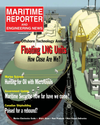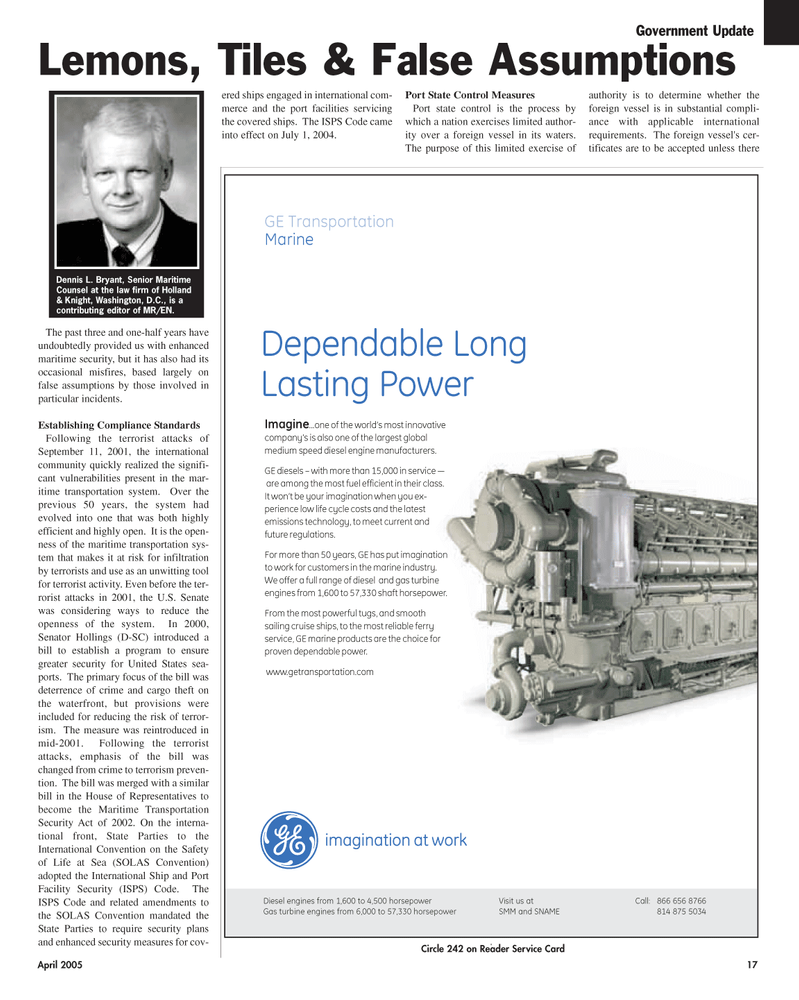
Page 17: of Maritime Reporter Magazine (April 2005)
The Offshore Industry Anual
Read this page in Pdf, Flash or Html5 edition of April 2005 Maritime Reporter Magazine
The past three and one-half years have undoubtedly provided us with enhanced maritime security, but it has also had its occasional misfires, based largely on false assumptions by those involved in particular incidents.
Establishing Compliance Standards
Following the terrorist attacks of
September 11, 2001, the international community quickly realized the signifi- cant vulnerabilities present in the mar- itime transportation system. Over the previous 50 years, the system had evolved into one that was both highly efficient and highly open. It is the open- ness of the maritime transportation sys- tem that makes it at risk for infiltration by terrorists and use as an unwitting tool for terrorist activity. Even before the ter- rorist attacks in 2001, the U.S. Senate was considering ways to reduce the openness of the system. In 2000,
Senator Hollings (D-SC) introduced a bill to establish a program to ensure greater security for United States sea- ports. The primary focus of the bill was deterrence of crime and cargo theft on the waterfront, but provisions were included for reducing the risk of terror- ism. The measure was reintroduced in mid-2001. Following the terrorist attacks, emphasis of the bill was changed from crime to terrorism preven- tion. The bill was merged with a similar bill in the House of Representatives to become the Maritime Transportation
Security Act of 2002. On the interna- tional front, State Parties to the
International Convention on the Safety of Life at Sea (SOLAS Convention) adopted the International Ship and Port
Facility Security (ISPS) Code. The
ISPS Code and related amendments to the SOLAS Convention mandated the
State Parties to require security plans and enhanced security measures for cov- ered ships engaged in international com- merce and the port facilities servicing the covered ships. The ISPS Code came into effect on July 1, 2004.
Port State Control Measures
Port state control is the process by which a nation exercises limited author- ity over a foreign vessel in its waters.
The purpose of this limited exercise of authority is to determine whether the foreign vessel is in substantial compli- ance with applicable international requirements. The foreign vessel's cer- tificates are to be accepted unless there
Diesel engines from 1,600 to 4,500 horsepower Visit us at Call: 866 656 8766
Gas turbine engines from 6,000 to 57,330 horsepower SMM and SNAME 814 875 5034
GE Transportation
Marine
Dependable Long
Lasting Power
Imagine…one of the world’s most innovative company’s is also one of the largest global medium speed diesel engine manufacturers.
GE diesels – with more than 15,000 in service — are among the most fuel efficient in their class.
It won’t be your imagination when you ex- perience low life cycle costs and the latest emissions technology, to meet current and future regulations.
For more than 50 years, GE has put imagination to work for customers in the marine industry.
We offer a full range of diesel and gas turbine engines from 1,600 to 57,330 shaft horsepower.
From the most powerful tugs, and smooth sailing cruise ships, to the most reliable ferry service, GE marine products are the choice for proven dependable power. www.getransportation.com
Government Update
Circle 242 on Reader Service Card
April 2005 17
Lemons, Tiles & False Assumptions
Dennis L. Bryant, Senior Maritime
Counsel at the law firm of Holland & Knight, Washington, D.C., is a contributing editor of MR/EN.
MR APRIL 2005 #3 (17-24).qxd 4/1/2005 2:52 PM Page 1

 16
16

 18
18
